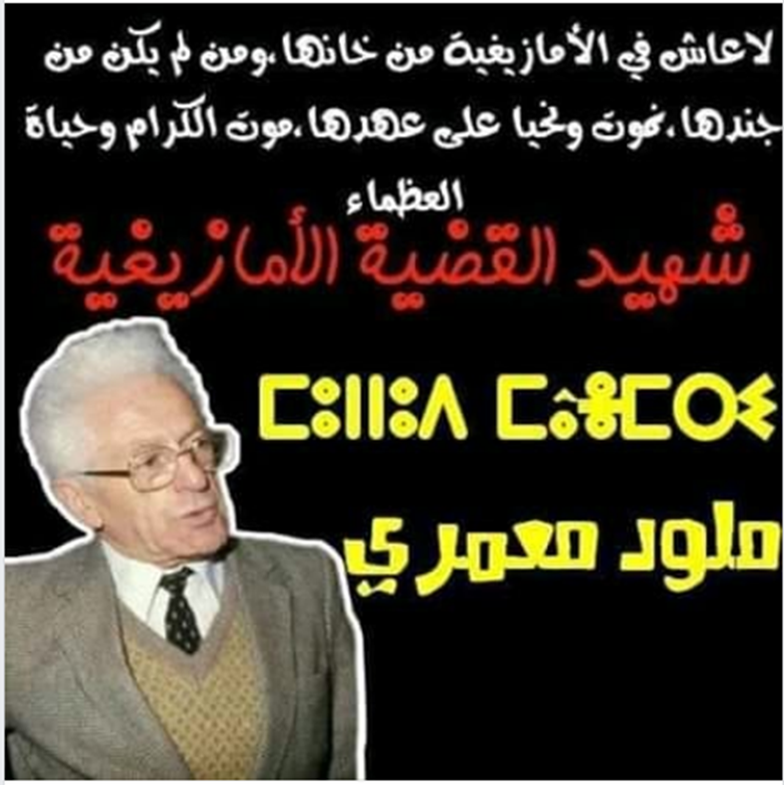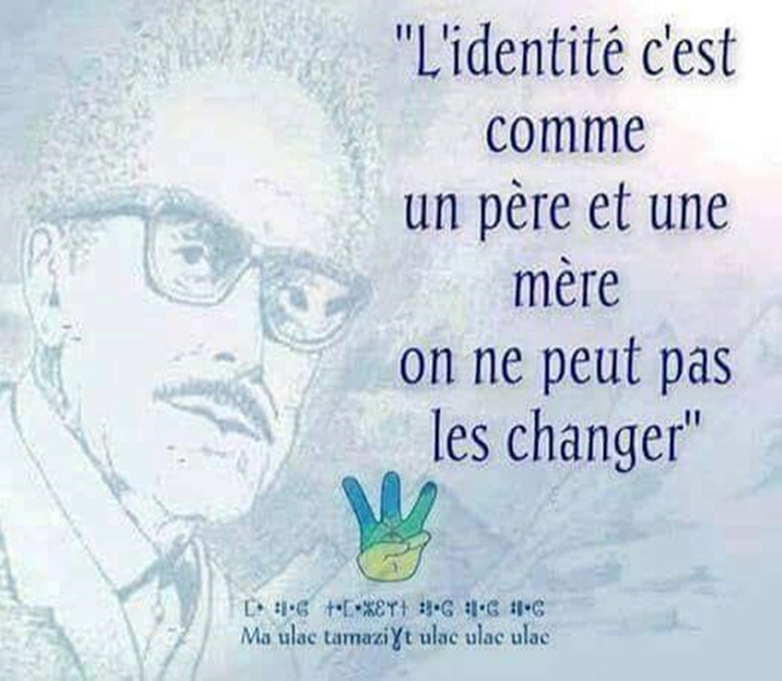Mouloud Mammeri’s last lecture: Poetry of the Kabyle Berbers

We are uploading Mouloud Mammeri's latest lecture entitled: Kabyle Berber Poetry, delivered by Mouloud Mammeri at USTHB (Algiers, Bab Azzouar) in late 1988. This lecture was recorded by a group of Mzab students with the means of time, an archival document provided by Nat Mzab
Mouloud Mammeri, the symbolic figure of Berber and Kabyle culture, the great man of knowledge (Amosnaw Amqrane) and clarity, left this decadent world on February 26, 1989. December 28, 1917 is his birth and the historic arrival of Azmoul (a symbol) to take the torch of the birth of the modern Berber language.
Death took him away shortly after he participated in the symposium in Oujda (Morocco) on his way back to his homeland. His primary field of work has always been the Berber culture and language of Algeria. All his life he was a defender of a spoken (written, by the way) language that is more than ever threatened by its plain and simple disappearance. This language revived by DDA LMULUD continues to contribute to the enrichment of this human cultural work which all peoples must contribute to preserving, producing and disseminating with nobility and pride.
The once-born DDA began writing his first article about the Amazigh community at the age of twenty. Can we now say that the Amazigh community is resisting and persevering? The Berber dialect groups in which the born DDA remains forever one of the most determined figures are doing great work today on their mother tongue.
Before we begin, I would like to mention a small fact, which is: It is clear that after what are now called the events of October, I think it is difficult to talk about any subject, without at least referring to the new circumstances that have occurred since then, for which, of course, a price has been paid. Very expensive.

But I only need to tell you this about a matter that I find almost inappropriate for you to give any speech after the events at that time because any speech will be evaluated under reality. With that said, I will pass on the topic that we are here today.
It is exactly as your companion has just mentioned that at the same time when I was your age I began writing novels, a novel at that.
I was interested very early, very young, in what is a very fundamental element of the culture of this country, namely the culture that was mine, the culture in which I grew up, and in which I spent my entire childhood... which mostly informed me, and part of which has been passed on elsewhere in my novels Or my plays, but I consider it in any case to have been a very decisive element, very decisive in my formation in general.
After that, of course, I loved you, that is, I went to university and attended a summer university in Algeria and then Paris (but it is clear, I think it is very clear, that the cultural growth in which I grew up is still a very essential part of my existence and what I was trying to achieve. So we will talk about a topic that may seem secondary A little to more pressing concerns, which is the Berber poetry of the Kabyles.

I think it's necessary before I get to the topic itself, but I think I'll do everything I can because it's too big to be exhausted in an area I don't know... an hour or so, at least, or even more. As for this, I will deal with part of it. Let me come back one day and deal with something else, and I will quickly summarize the last part or the last part. I think it is absolutely necessary, before getting to the subject itself, to address (I am talking to academics, so I prefer to “treat”) the oral cases themselves. . Because it is clear that this poetry is entirely oral, and therefore its orality will determine it to a large extent (not in one) not exhaustively, not completely, but we will see that, if we do not think a little beforehand about what is merely oral?
What are oral health conditions? It is almost impossible to truly understand this literature, or in any case you risk being ignored. Because there's a bias that needs to be sorted out now, before I even get started. This fanaticism is: You are university students, so you had access to literature, (say) international training, that is, when you learned there was literature, I don't know... English, French, Arabic, German, Spanish, Italian, etc..., literature. The Greatest in the World..., and (it means a kind of, watermark, if you like, but still present in reality) it means a judgment call to anything that is not of this great literature. Everything created (if you will) orally by the world, because it is not just us, is a (more) very widespread and even majority phenomenon in the rest of the planet.
Everything that was not written was literary, what should have been secondary, what would have been second-rate; While (I don't know if I would know it, but in any case it is my deep conviction, and I have tried in my books to show it, while) these things are as true as any production of written literature, especially. It's a small detail, but it doesn't matter. I really regretted that, you know, UNESCO (United Nations Educational and other). ),etc. Scientific and cultural organization)...
Finally, this is the body responsible for education and culture in the United Nations) that has a kind of institution that wants to appoint for each country a poet (or) not a writer, a man of culture who symbolically represents, in particular, this country, which is proposed for the rest of the world.
I have always regretted infinitely that a man of such magnitude, a genius of the greatness of Si Muyand Yu Muhand was never put forward in this context, because the poet who was Si Muyand Yu Miand, and even the thinker who was Si Muyand Yu Maand and the nature who was Si Muyand Yu Maand is completely On the level of any great written literature in the world. Only (when it happened) when this oral poetry is first perceived, as of..., in the end it is oral in origin, not clothed in a whole set (considered...) of the state, social conditions, etc... and even the materials, Otherwise, the media, for example. He is practically unknown to the masses (if you will) globally, of course, except for us, because he is our poet. At least one man remains that Si Mohand Yo Mand is of the nature and level of any great heights of great literature that you know.
But why wasn't it? Well, it is precisely because of the material conditions that preside over such literature, especially oral. Oral Morocco in our country (when I say in our country I mean Morocco) is in our country a very ancient history. The Short Maghreb or the Grand Maghreb, God willing. By the way, I shouldn't have said Morocco, as if I had said North Africa, since I don't see why we follow the oral Maghreb in this literature, a very old story. It practically began at the beginning of history in our country. How did that even happen?
Source: aokas-aitsmail. Active forum. information

